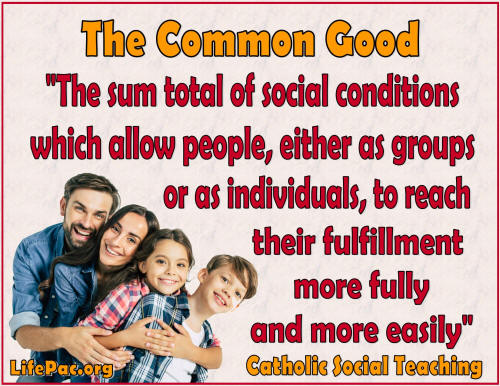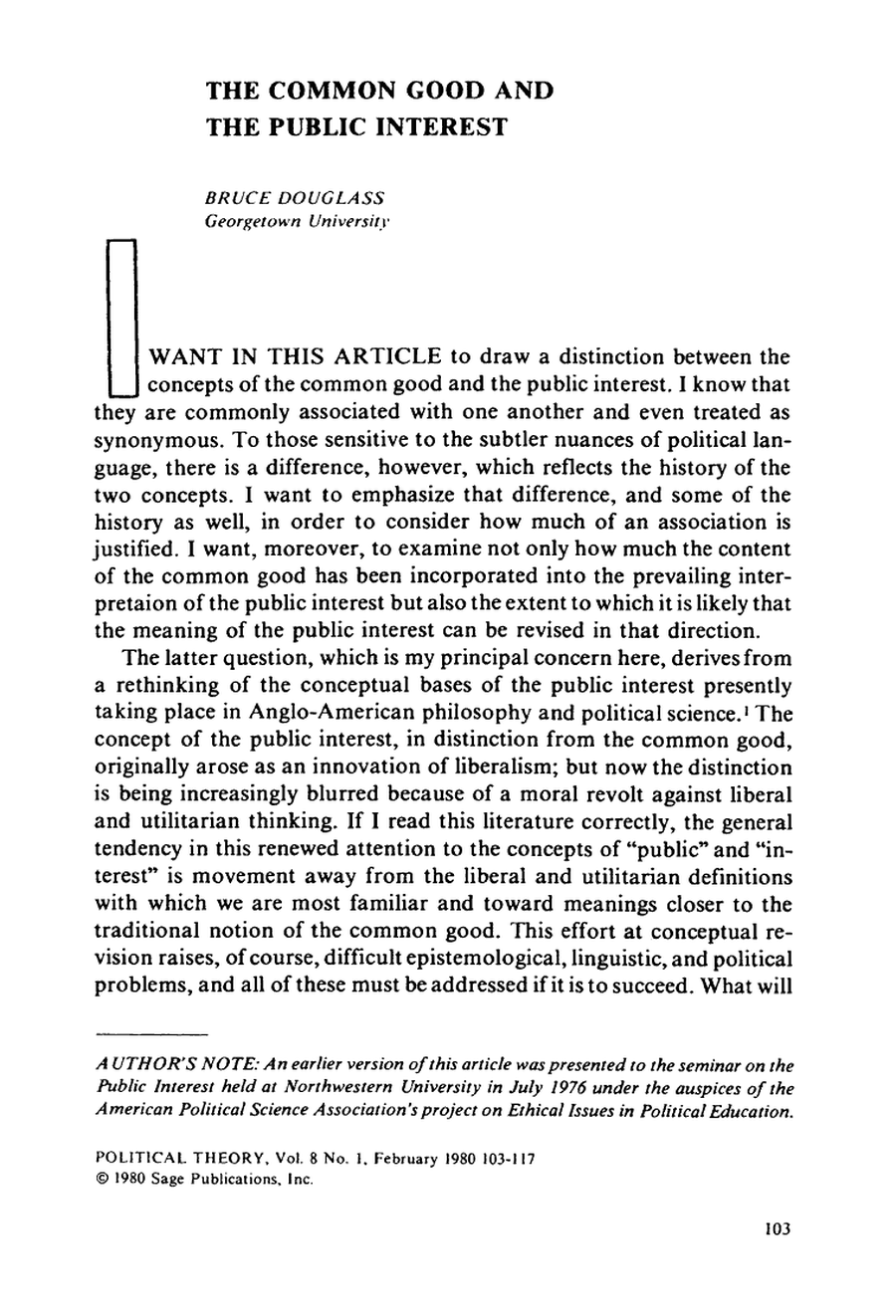
|
Constitution of the United States
The Preamble: "We the People of the United States, in
Order to form a more perfect Union, establish Justice,
insure domestic Tranquility, provide for the common defence,
promote the general Welfare,
and secure the Blessings of Liberty to ourselves and our
Posterity, do ordain and establish this Constitution for the
United States of America."
|
AI Question:
Assuming that human life begins at conception, does legal
abortion serve the Common Good? Why or why not?
|

Quote from Catholic Compendium, par 164
|
Plato, The Republic, Bk 4:
"... our aim in founding
the State was not the disproportionate happiness of any one
class, but the greatest happiness of the whole; we thought
that in a State which is ordered with a view to the good of
the whole we should be most likely to find Justice, and in
the ill-ordered State injustice: and, having found them, we
might then decide which of the two is the happier."
Aristotle Quotes
Aristotle: “To secure the good of one person only is better
than nothing; but to secure the good of a nation or a state
is a nobler and more divine achievement. ” (Nicomachaean
Ethics, 1094b)
|
James Madison on The Common Good and Institutional
Corruption:
The Federalist Papers, Essay No. 10
"The two great
points of difference between a democracy and a republic, are
first, the delegation of the government, in the latter, to a
small number of citizens elected by the rest; secondly, the
greater number of citizens, and greater sphere of country,
over which the latter may be extended. The effect of
the first difference is, on the one hand, to refine and
enlarge the public views, by passing them through the medium
of a chosen body of citizens, whose wisdom may best discern
the true interest of their country,
and whose patriotism and love of justice, will be least
likely to sacrifice it to temporary or partial
considerations. Under such a regulation, it may well happen
that the public voice pronounced by the representatives of
the people, will be more consonant to
the public good, than if pronounced by the people
themselves convened for the purpose. On the other hand, the
effect may be inverted. Men of factious tempers, of local
prejudices, or of sinister designs, may by intrigue, by
corruption, or by other means, first obtain the suffrages,
and then betray the interests of the
people."
“The latent causes of faction
are thus sown in the nature of man ... human passions have,
in turn, divided mankind into parties, inflamed them with
mutual animosity, and rendered them much more disposed to
vex and oppress each other than to co-operate
for their
common good.”
More Madison Quotes
|
The Flavours of the Common Good. A Conversation with Dr. J Budziszewski
Professor,
University of Texas, Austin
The Common Good Project
Apr 1, 2021
Video, 1:13:00
Between Man and Man: Friendship, Law, and the Common Good
Article, J Budziszewski , May 15, 2021
|
How do we discern basic goods? - John Finnis
Oxford Conversations, 2017,
Video, 5 minutes
Basic Goods make up
The Common Good
|
Pacem In Terris – Peace on Earth
Encyclical Of Pope John
XXIII
On Establishing Universal
Peace In Truth, Justice, Charity, And Liberty (April 11,
1963)
"54. The attainment of the
common good is the sole reason
for the existence of civil authorities. In working for the
common good, therefore, the
authorities must obviously respect its nature, and at the
same time adjust their legislation to meet the requirements
of the given situation ."
|
Catholic Social Teaching Quotes:
It is out of love for one's own good and for that of others
that people come together in stable groups with the purpose
of attaining a common good. (Par 150)
The common
good indicates “the sum total of social conditions which
allow people, either as groups or as individuals, to reach
their fulfillment more fully and more easily. (Par 164)
The responsibility
for attaining the common good, besides falling to individual
persons, belongs also to the State, since
the common good is
the reason that the political authority exists. (Par 168)
God is the ultimate end of his creatures and for no
reason may the common good be deprived of its transcendent
dimension, which moves beyond the historical dimension while
at the same time fulfilling it. (Par 170)
|
Common Good Conservatism In Action
by Terry Schilling, 2
. 17 . 20
Over the past year,
conservatism has changed. At least, the way conservative
intellectuals and some politicians talk has changed. Many
now speak of orienting our society toward
the common good,
and about using government power to pursue that good. But
has anything really changed within the Republican party?
Politics and policy often run a course independent of
philosophical debate. Are policymakers ready to go on
offense and commit to a different strategy for combating
transgender ideology and the gay agenda? The answer seems to
be yes ...
And as usual, those at the grassroots
level are leading the way. The conservative establishment in
Washington would be wise to follow suit—because if
conservatism is to survive as a movement, embracing the
“common good” is the only path forward.
Terry Schilling Family Values Podcast, 3/22/21
American
Principles Project
|
Thomas
Aquinas
What
Is Politics About Anyway? Thomas Aquinas on the
Common Good
Fr. Aquinas Guilbeau, O.P., May 3, 2020
YouTube Video,
Lecture length 49:00
Aquinas on the
Common Good
Philosophy Explained, 8/2018
YouTube Video,
|
Millennials & The Parallel Polis
The American Conservative, Feb 27,
2018
This article is about
reestablishing The Common Good, and wresting control of
society from the corrupting technology oligarchy.
"The Parallel Polis is not about building a gated community
for Christians but rather about establishing (or
re-establishing) common practices and common institutions
that can reverse the isolation and fragmentation of
contemporary society."
Vaclav Benda, Man Of Conscience
The American Conservative, Mar 6, 2018
Cancel
Culture is AWAKENING a Conservative Parallel Society!!!
YouTube, Dr. Steve
Turley, Feb 19, 2021
|
|
Subsidiarity
Wikipedia Subsidiarity Article
"Subsidiarity is a principle
of social organization that holds that social and political
issues should be dealt with at the most immediate or local
level that is consistent with their resolution."
Subsidiarity, Participation, and the
Common Good
HearthAndField.com,
2021
"The principle of
subsidiarity requires that organizations of a higher order
(such as the State) assume a posture of support in relation
to lower/smaller organizations."
What is Subsidiarity?
A well-ordered society includes institutions both
large and small working together for the public good.
USCatholic.org, Sept 17, 2018
Alexis de Tocqueville, Subsidiarity, and Clericalism
Homiletic and Pastoral Review,
Oct 29, 2018
"According to the Compendium of Social Doctrine of
the Church, subsidiarity is one of the four “pillars” of the
Catholic Church’s official social doctrine, along with human
dignity, the common good, and solidarity."
The Principle of Subsidiarity and the “Welfare
State”
Homiletic and Pastoral Review, CatholicCulture.org, 2009
"The term 'subsidiarity,' derived from the Latin subsidium,
means 'support, help or assistance.' In effect, subsidium
refers to a second line of defense, a back-up that would
come as aid."
The Principle of Subsidiarity
The Acton Institute, July 20,
2010
"In other words, any activity which can be performed
by a more decentralized entity should be. This principle is
a bulwark of limited government and personal freedom. It
conflicts with the passion for centralization and
bureaucracy characteristic of the Welfare State."
|
Christianity and the Common Good
Harvard Law
School Conference
October 19 & 20,
2018
Presentations:
From the Common Good to Public Order
(and Back)
Prof. Gladden Pappin (University of Dallas)
Faith, Natural Law And The
Common
Good
Prof. J. Budziszewski (University of Texas,
Austin)
Defending the Common Good: Mercy and
Punishment, from Stoicism to Christianity
Prof. Sarah
Byers (Boston College)
Shakespeare, the Book of Sir Thomas More, and the
Common
Good
Prof. Gerard Wegemer (University of Dallas)
|
Catholics and the Political Common Good Today
"America, Liberalism, and Catholicism" JPII Conference
University of Dallas, American Public Philosophy Institute,
Liberal Learning for Life
Daniel Burns (University of
Dallas) and Chad Pecknold (Catholic University of America)
April 16th, 2021
90 min video
The Common Good
Santa Clara University Markkula
Center For Applied Ethics
Commenting on the many economic and
social problems that American society confronts, Newsweek
columnist Robert J. Samuelson once wrote: "We face a choice
between a society where people accept modest sacrifices for
a common good or a more contentious society where groups
selfishly protect their own benefits." The common good has
been an important ethical concept in a society that has
encouraged many to "look out for Number 1."
|
What is the Common Good? A
Conversation with Adrian Vermeule
University of Oxford, School of Law,
The Aquinas Institute and The Common Good Project
Feb 24,
2021
60 min video
|
|
Toward a Common Good Approach to Constitutionalism. A
Conversation with Dr. Conor Casey
The Common Good Project, Mar 17, 2021
61 min video
|
The promise & peril of the political
common good
by Ryan T. Anderson
Jan 2022
Rebuttal to
The fallacies of the common good by Kim R. Holmes
|
The Common Good
is not the same as the hedonistic,
utilitarian "Greater Good." From
The
Century Dictionary: Utilitarianism - The doctrine that
the greatest happiness of the greatest number should be the
sole aim of all public action, together with the
hedonistic theory of ethics, upon which this doctrine
rests. From
Wiktionary: Utilitarianism - The theory that action
should be directed toward achieving the "greatest happiness
for the greatest number of people" (hedonistic universalism),
or one of various related theories. Legalized abortion
can be justified using Utilitarianism. "Plato despised
democracy, and he expected leaders to weave noble lies for
the greater good" (opendemocracy.net).
|
Full article available for
free
on JSTOR for registered users. A well regarded
article from 1980 ...

|
The Baby and the Bathwater
Ryan T.
Anderson & Robert P. George
National Affairs,
Fall 2019
"Debates about political ideals and institutions are now too
often framed as presenting two extreme and unappealing
options. On the one hand is a radical commitment to
foundational, philosophical liberalism of a Lockean-Rawlsian
sort, with all that that presupposes and entails for
philosophical anthropology, official "neutrality" about the
good, the sidelining of religion, and the exclusion of
religious arguments from public debate. On the other hand is
illiberalism, where liberty itself is devalued even as an
instrumental good or a condition for the realization of
human goods by free choice and action. According to this
view, civil liberties such as freedoms of speech and
religion ought to be extensively pared back on the ground
that "error has no rights," and political authority should
be subordinated in a more or less comprehensive way to
spiritual authority. "
|
Democracy, “The Problem of
Minorities,” and the Theology of the
Common Good
FULLER MAGAZINE: ISSUE 18,
2020
"Although there
are various interpretations of the meaning of
the common
good, Catholic social teaching highlights the following
principles: rejection of the extremes of individualism and
collectivism (or liberal democracy and social democracy); an
emphasis on freedom, equality, and the participation of
persons in society as well as the incorporation of human
rights; a challenge to the utilitarian approach of a majoritarian view; a vision for a politics of consensus to
reach a maximum agreement toward the advantage of all, such
as the case of the rule of law; and a requirement that the
parties pursue commonality and relationship."
|
| |
|
